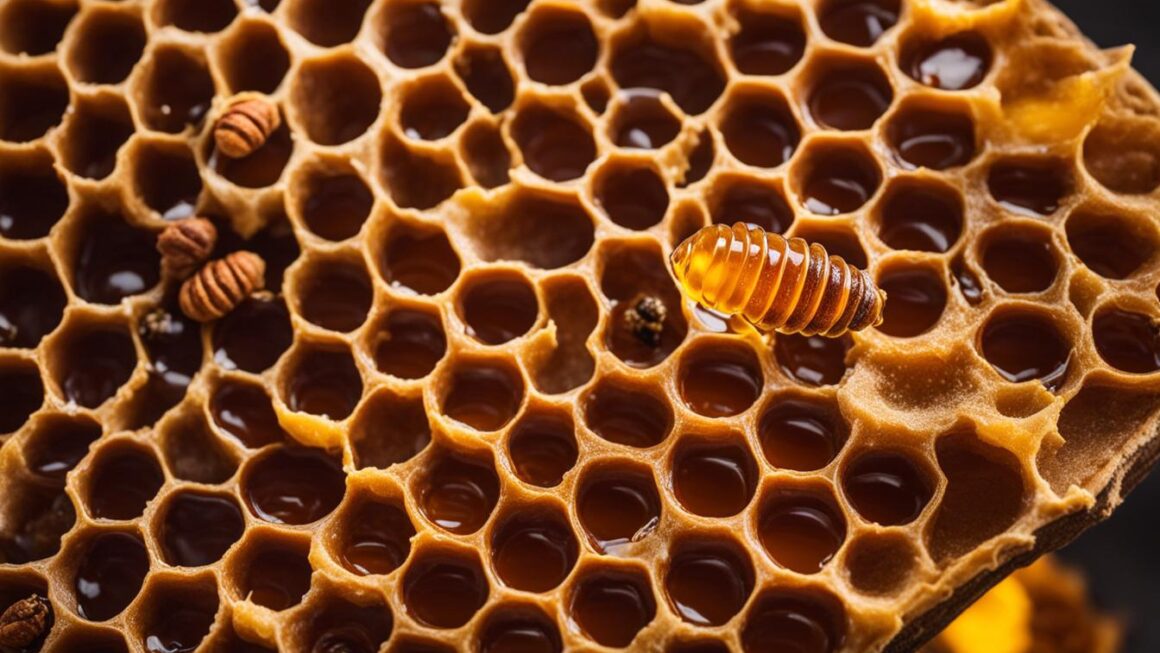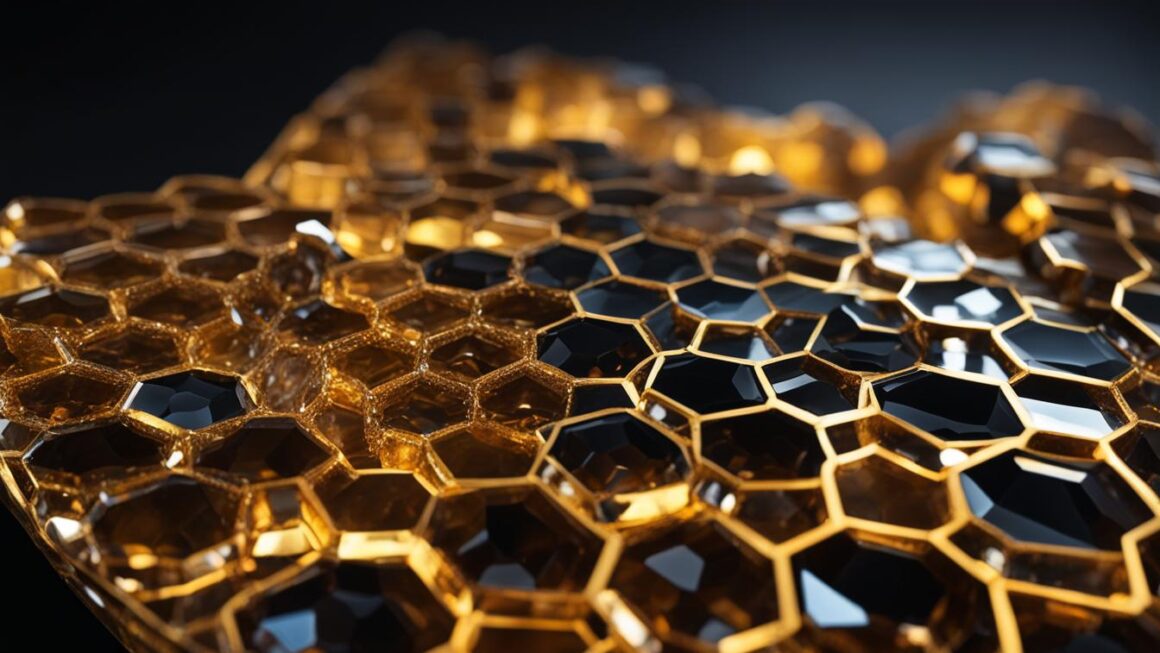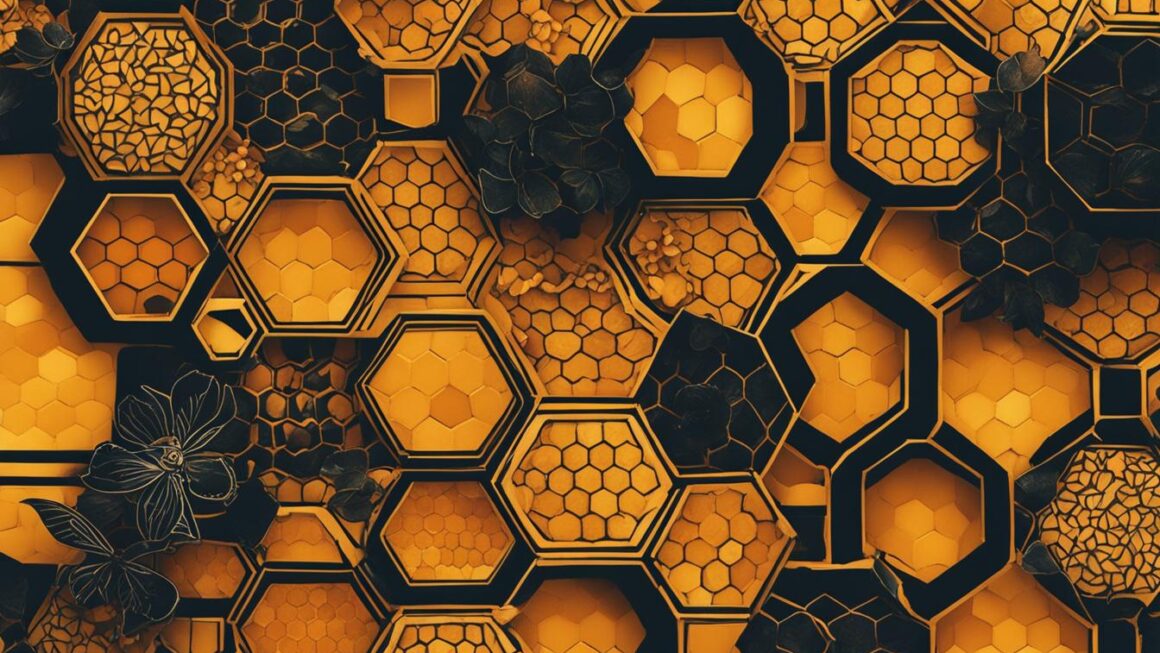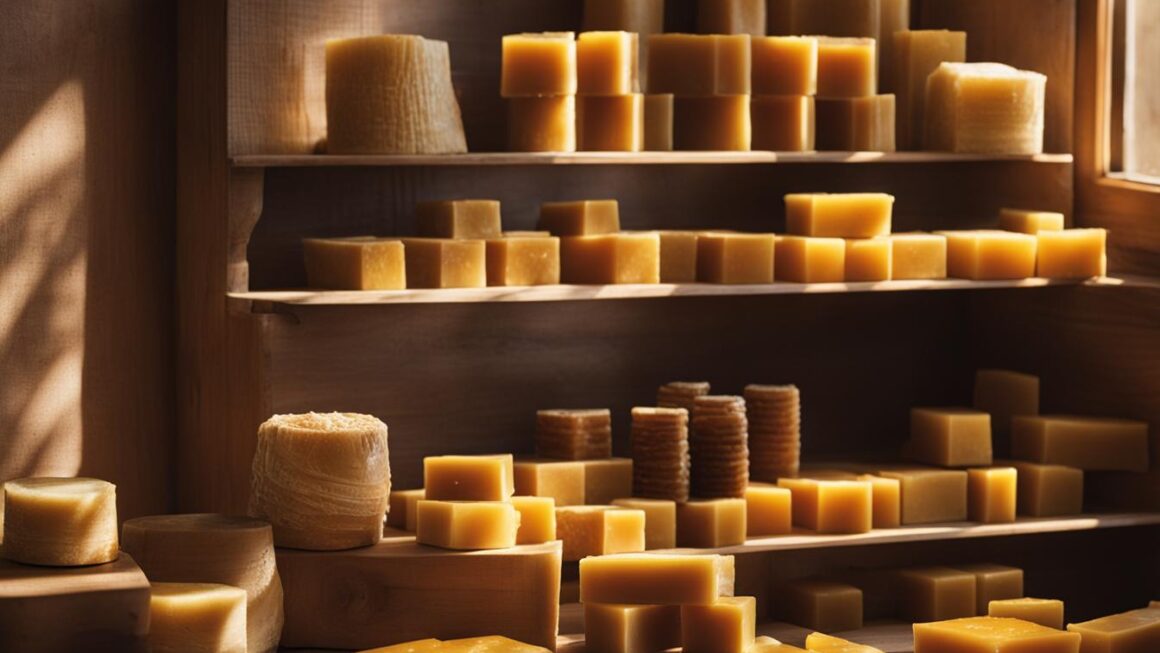Are you looking for a natural and delicious way to boost your health? Look no further than honeycomb! Not only is honeycomb a sweet and tasty treat, but it also offers a plethora of incredible health benefits. Packed with essential vitamins and minerals, honeycomb is a nutritional powerhouse that can support your overall well-being.
Raw honeycomb contains calcium, zinc, magnesium, and a range of vitamins including A, B6, B12, C, D, and E. These nutrients play a vital role in maintaining a healthy body and promoting optimal function. But that’s not all – honeycomb also offers a host of other health benefits.
Key Takeaways:
- Honeycomb is packed with essential vitamins and minerals.
- Honeycomb supports heart health and cholesterol levels.
- Honeycomb boosts the immune system and protects liver function.
- Honeycomb promotes healthy sleep cycles and improves gut health.
- Eating raw honeycomb allows you to enjoy unprocessed nutrients and natural sweetness.
What is Raw Honeycomb?
Raw honeycomb is the edible honey stored by bees in wax cells during their collection process. It is a natural and unprocessed form of honey, free from chemicals and artificial additives. Raw honeycomb is packed with nutrients and offers a range of health benefits. It is not only delicious but also provides a unique experience with its distinct taste and texture.
Unlike processed honey, raw honeycomb contains the entire honeycomb structure, including the wax cells and honey. This means that when you consume raw honeycomb, you are benefiting from all the nutrients and enzymes present in the honeycomb. It is a rich source of essential vitamins and minerals, such as calcium, zinc, magnesium, and vitamins A, B6, B12, C, D, and E.
Some people even use raw honeycomb as an alternative to chewing gum or incorporate it into their skincare routine for its anti-inflammatory and antimicrobial properties. Raw honeycomb is a versatile and healthy addition to your diet, allowing you to enjoy the natural sweetness and reap the benefits of its unprocessed nutrients.
What is Raw Honeycomb?
10 Health Benefits of Raw Honeycomb
Raw honeycomb offers a multitude of health benefits, making it a valuable addition to your diet. Here are 10 reasons why you should consider incorporating raw honeycomb into your daily routine:
- Nutritional Value: Raw honeycomb contains essential vitamins and minerals, including calcium, zinc, magnesium, and vitamins A, B6, B12, C, D, and E.
- High Antioxidant Content: The antioxidants present in honeycomb help promote heart health by reducing bad cholesterol levels and increasing good cholesterol.
- Low Glycemic Index: Honeycomb is a low glycemic index food, meaning it doesn’t cause sharp spikes in blood sugar levels, making it a healthier sweet snack option.
- Immune Boosting: Raw honeycomb possesses antibacterial properties that can help strengthen your immune system and protect against common illnesses.
- Liver Protection: The antioxidants in honeycomb help protect and enhance liver function, aiding in the detoxification process.
- Cold and Allergy Relief: Consuming raw honeycomb can help alleviate symptoms of colds and allergies, thanks to its antimicrobial and anti-inflammatory properties.
- Improved Gut Health: Honeycomb acts as a prebiotic, promoting the growth of beneficial gut bacteria and aiding digestion.
- Healthy Sleep Patterns: The natural sugars and amino acids present in honeycomb can help regulate sleep cycles, promoting better-quality sleep.
- Full Spectrum of Nutrients: Eating raw honeycomb allows you to benefit from the unprocessed nutrients found in honey and bee products, such as pollen, propolis, and royal jelly.
- Better Overall Health: Incorporating raw honeycomb into your diet provides a wide range of health benefits and contributes to an overall healthier lifestyle.
By enjoying raw honeycomb, you can nourish your body with essential nutrients and experience the numerous health advantages it offers. Whether you consume it as a standalone snack, add it to your morning yogurt, or use it as a natural sweetener in recipes, raw honeycomb is a delicious and nutritious choice.
How to Eat Raw Honeycomb
Raw honeycomb is a versatile and delicious food that can be enjoyed in various ways. Here are some ideas on how to incorporate raw honeycomb into your diet:
- Melt it onto warm bread or pancakes to add a natural, sweet flavor.
- Add it to a cheese board with salty cheeses, fruits, nuts, and bread for a delightful and unique combination of flavors.
- Use it as a natural cough syrup or lozenge by sucking on a small piece to soothe a sore throat.
- Dip a piece of honeycomb into hot cocoa for a sweet and rich alternative to traditional sweeteners.
- Top your morning yogurt or oatmeal with honeycomb for added texture and sweetness.
Raw honeycomb can also be enjoyed on its own, allowing you to savor its natural taste and unique texture. The darker the honey, the more potent its health benefits and flavor. Experiment with different ways to enjoy raw honeycomb and discover your favorite way to indulge in this nutritious treat.
“There are many ways to enjoy raw honeycomb, and each bite is an opportunity to savor its natural sweetness and numerous health benefits.” – Honeycomb Lover
Raw honeycomb is a delicious addition to recipes and can be used as a natural sweetener in baking and cooking. Its unique flavor and texture can elevate dishes and provide a healthier alternative to processed sugars. Whether you use it in a recipe or enjoy it on its own, raw honeycomb is a delightful treat that offers both taste and health benefits.
Table: Ways to Enjoy Raw Honeycomb
| Method | Description |
|---|---|
| Melt onto warm bread or pancakes | Spread raw honeycomb onto freshly baked bread or pancakes for a natural sweetener. |
| Add to a cheese board | Pair raw honeycomb with salty cheeses, fruits, nuts, and bread to create a delicious and balanced cheese board. |
| Use as a cough syrup or lozenge | Suck on a small piece of raw honeycomb to soothe a sore throat and enjoy its antimicrobial properties. |
| Dip into hot cocoa | Dip a piece of raw honeycomb into a hot cup of cocoa to add a natural sweetener and enhance the flavor. |
| Top yogurt or oatmeal | Sprinkle raw honeycomb on top of your morning yogurt or oatmeal for added sweetness and texture. |
Why Bees Make Honeycombs
Bees make honeycombs for a variety of reasons, each serving a crucial purpose in their hive. The intricate hexagonal structure of the honeycomb provides a stable and efficient storage area for honey, pollen, and larvae. This shape allows bees to maximize space and conserve wax, making it a highly efficient storage solution. The thick walls of each cell also help regulate temperature and airflow within the hive, ensuring optimal conditions for the colony’s survival.
The purpose of honeycombs extends beyond storage. The shape of the cells prevents food spillage and condensation buildup, maintaining cleanliness and preventing the growth of harmful bacteria. Honeycombs also serve as a platform for bees to communicate through their famous “waggle dance,” where they indicate the location and quality of nectar sources to their fellow hive members. Overall, honeycombs are essential for the proper functioning and survival of a healthy bee colony.
The Efficiency of Honeycomb Structure
The hexagonal shape of honeycomb cells is not only visually stunning but also mathematically perfect. This shape allows for the most efficient use of space and resources by minimizing both material and energy waste. It is a testament to the remarkable instincts and abilities of bees to create such an optimal structure without any central planning or mathematical knowledge. The hexagonal pattern ensures that every cell is in contact with six other cells, creating a strong and stable structure.
“The cells of a honeycomb are the perfect example of nature’s brilliant design. The hexagonal shape is not only aesthetically pleasing, but it maximizes the use of space and materials, providing the bees with an efficient storage system.”
Through millions of years of evolution, bees have perfected the construction of honeycombs to meet the specific needs of their colony. It is a testament to their incredible instincts and remarkable abilities to create such a complex and efficient structure. Understanding the why behind honeycomb formation gives us a deeper appreciation for the amazing world of bees and their invaluable contributions to our ecosystem.
Honeycomb and Its Benefits
Honeycomb is not only a delicious treat but also offers numerous health benefits. Packed with essential vitamins, minerals, enzymes, and antioxidants, honeycomb is a natural superfood that can enhance your overall well-being.
One of the main advantages of eating honeycomb is its nutritional density. It contains a wide range of vitamins, such as A, B6, B12, C, D, and E, as well as essential minerals like calcium, zinc, and magnesium. These nutrients play a vital role in supporting various bodily functions and promoting good health.
Honeycomb also possesses antimicrobial properties, which help fight off infections and reduce inflammation in the body. Moreover, it can soothe sore throats, aid digestion, promote better sleep, and act as a natural sweetener in recipes. These benefits, combined with its rich and unique taste, make honeycomb an excellent addition to your diet.
Summarizing the health effects of honeycomb:
- Rich in essential vitamins and minerals.
- Offers antimicrobial properties and reduces inflammation.
- Can soothe sore throats and aid digestion.
- Promotes better sleep and acts as a natural sweetener.
Embrace the benefits of honeycomb and indulge in its delicious taste while supporting your health and well-being.
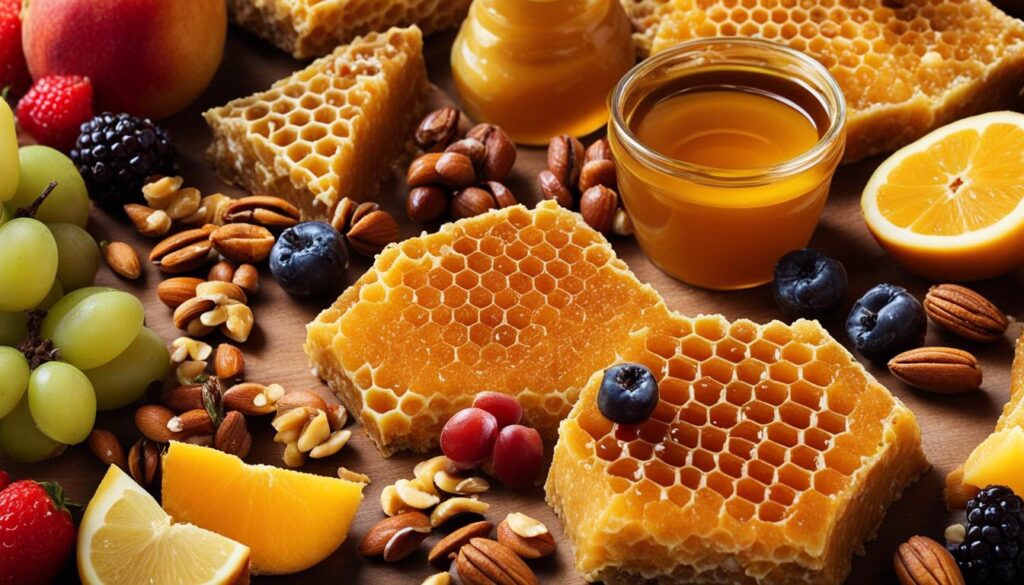
Eating Honeycomb in the UK
Honeycomb is a delicious and nutritious food that can be enjoyed by people in the UK. It is a natural and raw form of honey stored by honey bees in wax cells. Packed with essential vitamins, minerals, and antioxidants, honeycomb offers numerous health benefits. Whether you want to incorporate honeycomb into your diet or use it as a sweetener in baking recipes, there are various ways to enjoy this natural delicacy.
One popular way to eat honeycomb in the UK is to spread it on warm bread or pancakes. The natural sweetness and rich flavor of honeycomb enhance the taste of these breakfast favorites. Additionally, you can add honeycomb to a cheese board with salty cheeses, fruits, nuts, and bread for a unique culinary experience.
If you prefer a warm beverage, you can dip honeycomb into hot cocoa or use it as a sweetener in tea or coffee. The natural sweetness of honeycomb adds a delightful touch to your drink. For a healthier option, you can top your morning yogurt or oatmeal with honeycomb to elevate its taste and nutritional value.
| Ways to Enjoy Honeycomb in the UK: |
|---|
| – Spread on warm bread or pancakes |
| – Add to a cheese board with salty cheeses, fruits, nuts, and bread |
| – Dip into hot cocoa or use as a sweetener in tea or coffee |
| – Top morning yogurt or oatmeal with honeycomb |
When purchasing honeycomb in the UK, it is essential to consider its source and opt for organic honeycomb. Organic honeycomb is free from antibiotics and other artificial additives, ensuring that you are consuming a high-quality and natural product. You can find honeycomb at local health food stores, farmers’ markets, or online retailers. So why not indulge in the delicious taste and health benefits of honeycomb today?
Our Delicious Honeycomb From Forest Trees and Flowers
Experience the exquisite taste and incredible health benefits of our high-quality, forest-sourced honeycomb. Our organic honeycomb is carefully harvested from the nectar of forest trees and wildflowers, ensuring a truly unique and natural product. By purchasing our honeycomb, you can enjoy the pure goodness of nature while supporting sustainable beekeeping practices.
Our honeycomb is sourced from pristine forests and meadows, where bees collect nectar from a diverse range of plants, including oak, chestnut, and wildflowers. This diverse foraging environment gives our honeycomb a rich, complex flavor profile that is truly unmatched. Every bite is bursting with the natural sweetness of the forest, making it a perfect addition to your favorite recipes or enjoyed on its own.
“Our honeycomb is sourced from pristine forests and meadows, where bees collect nectar from a diverse range of plants, including oak, chestnut, and wildflowers.”
Not only is our honeycomb delicious, but it also offers a wide range of health benefits. Packed with vitamins, minerals, and antioxidants, our honeycomb is a nutritious powerhouse that supports immune function and overall well-being. Incorporating honeycomb into your diet can help boost your energy levels, promote healthy digestion, and strengthen your body’s natural defenses.
| Honeycomb Benefits | Description |
|---|---|
| Nutritionally Dense | Our honeycomb is packed with essential vitamins, minerals, and enzymes that nourish your body and support optimal health. |
| Antioxidant-Rich | The antioxidants found in honeycomb help fight oxidative stress and inflammation, protecting your cells from damage. |
| Anti-Inflammatory | Honeycomb has natural anti-inflammatory properties that can help reduce inflammation in the body and promote overall wellness. |
| Supports Digestive Health | The enzymes in honeycomb aid in digestion, helping to break down food and improve nutrient absorption. |
| Enhances Immune Function | The natural compounds in honeycomb help strengthen the immune system, protecting against common illnesses and infections. |
Indulge in the richness of our forest-sourced honeycomb and experience the incredible taste and benefits it has to offer. Each bite is a true delight, connecting you with the wonders of nature and supporting your well-being. Order your organic honeycomb today and savor the goodness of the forest in every sweet, golden cell.
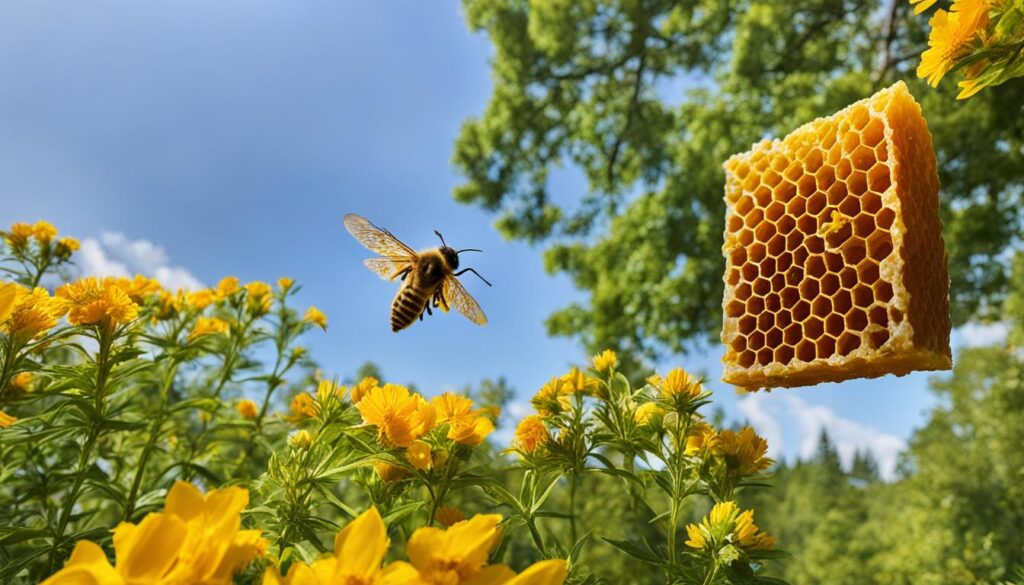
How to Use Honeycomb
Honeycomb is a versatile ingredient that can be used in various ways to add a unique flavor and nutritional benefits to your meals and beverages. Whether you want to enhance the taste of your morning yogurt, experiment with creative recipes, or simply enjoy its natural sweetness, honeycomb is a delightful addition to your culinary repertoire.
Here are some ideas on how to use honeycomb:
- Spread: Melt honeycomb onto warm bread or English muffins for a deliciously sweet and sticky treat.
- Topping: Add honeycomb as a topping to sweet pastries like cakes or pies for a touch of natural sweetness.
- Yogurt or Oatmeal: Enhance the flavor of your morning yogurt or oatmeal by crumbling honeycomb on top.
- Homemade Desserts: Incorporate honeycomb into your favorite dessert recipes like cookies, muffins, or ice cream for a unique twist.
- Tea: Stir a piece of honeycomb into your tea for a natural sweetener with added benefits.
- Coffee: Add a touch of honeycomb to your coffee for a hint of sweetness and complexity.
- Lemonade: Enhance your homemade lemonade with honeycomb for a refreshing and natural twist.
The possibilities are endless when it comes to incorporating honeycomb into your culinary creations. Get creative in the kitchen and enjoy the unique taste and health benefits that honeycomb has to offer.
Potential Dangers of Eating Honeycomb
Eating honeycomb is generally safe and offers numerous health benefits. However, it’s essential to be aware of potential dangers and risks associated with its consumption. By understanding and taking precautions, you can safely enjoy the delicious and nutritious honeycomb.
Honeycomb Allergies
One potential danger is honeycomb allergies. People with allergies to bee venom or pollen should exercise caution when consuming honeycomb, as it may trigger an allergic reaction. It is important to be aware of any known allergies and seek medical advice if unsure.
Furthermore, honeycomb can contain traces of propolis, which is a resinous substance that bees use to seal the hive. Propolis allergies are rare but can cause allergic reactions in some individuals. If you have a known sensitivity to propolis, it is best to avoid honeycomb or consult with a healthcare professional before consuming it.
Risks of Contamination
Another potential risk is the contamination of honeycomb with C. botulinum spores. These spores can be harmful, primarily for pregnant women and infants under 12 months of age, as they may cause botulism, a severe form of food poisoning.
To reduce the risk of contamination, it is crucial to source honeycomb from reputable and reliable suppliers. Opting for organic honeycomb ensures that it is free from antibiotics and other artificial additives, minimizing the chances of contamination.
Possible Stomach Obstructions
Consuming large amounts of honeycomb, particularly if it is not adequately chewed, can pose a risk of stomach obstructions. The wax cells of honeycomb can be difficult to break down and may cause digestive issues if consumed in excessive quantities.
To avoid this risk, it is recommended to chew honeycomb thoroughly before swallowing. If you have a history of digestive problems or concerns, it is advisable to consult with a healthcare professional before incorporating honeycomb into your diet.
| Potential Dangers of Eating Honeycomb | Precautions |
|---|---|
| Honeycomb Allergies | Be cautious if you are allergic to bee venom, pollen, or propolis. Seek medical advice if unsure. |
| Risks of Contamination | Source honeycomb from reputable suppliers and opt for organic honeycomb to minimize the risk of contamination. |
| Possible Stomach Obstructions | Chew honeycomb thoroughly before swallowing. Consult a healthcare professional if you have digestive concerns. |
While there are potential dangers associated with eating honeycomb, these risks can be minimized by taking necessary precautions. By being aware of your allergies, sourcing honeycomb from reliable suppliers, and consuming it in moderation, you can safely enjoy the many benefits of this natural superfood.
Conclusion
In conclusion, honeycomb is a natural and nutritious superfood that offers a wide range of health benefits. Its high nutritional value, including essential vitamins and minerals, makes it a valuable addition to any diet. The antioxidants in honeycomb promote heart health by lowering bad cholesterol and increasing good cholesterol, while its low glycemic index makes it a safe sweet snack for those concerned with their blood sugar levels.
Honeycomb also boosts the immune system, supports liver function, improves gut health, and promotes healthy sleep cycles. Incorporating honeycomb into your diet allows you to benefit from unprocessed nutrients and enjoy its natural sweetness. Whether you enjoy it on its own, melt it onto warm bread, or add it to your favorite recipes, honeycomb is a versatile and delicious option.
When purchasing honeycomb, it is essential to opt for organic and high-quality sources to ensure you are getting a product free from antibiotics and chemicals. Consuming honeycomb in moderation is recommended, and individuals with allergies to bee venom or pollen should exercise caution. By choosing organic honeycomb and enjoying it responsibly, you can savor all the wonderful health benefits that honeycomb has to offer.
FAQ
What are the health benefits of eating honeycomb?
Eating honeycomb offers numerous health benefits, including high nutritional value, heart health support, blood sugar regulation, immune system boosting, liver function protection, cold and allergy prevention, improved gut health, and promotion of healthy sleep cycles.
What is raw honeycomb?
Raw honeycomb is the honey stored by bees in wax cells during their collection process. It is entirely edible and not exposed to chemicals or artificial processing.
What are the health benefits of raw honeycomb?
Raw honeycomb provides essential vitamins and minerals, promotes heart health, sweetens food without spiking blood sugar levels, boosts the immune system, protects liver function, fights off colds and allergies, improves gut health, and promotes healthy sleep cycles.
How can I eat raw honeycomb?
There are various ways to enjoy raw honeycomb. You can melt it onto warm bread or pancakes, add it to a cheese board, use it as a cough syrup or lozenge, dip it into hot cocoa, top your morning yogurt or oatmeal with it, or savor it on its own.
Why do bees make honeycombs?
Bees make honeycombs to provide a stable structure and storage area for honey, pollen, and larvae. The hexagonal shape allows for efficient use of wax, regulates temperature and airflow, and prevents food spillage and condensation build-up.
What are the benefits of honeycomb?
Honeycomb offers essential vitamins and minerals, antimicrobial properties, anti-inflammatory effects, digestion aid, natural sweetening alternative, and benefits for skin health.
Can I eat honeycomb in the UK?
Yes, you can eat honeycomb in the UK. Honeycomb is a delicious and nutritious food that has been enjoyed by humans for centuries. It is rich in protein, minerals, vitamins, and antioxidants.
Where can I find high-quality honeycomb?
Our team proudly offers high-quality, raw, and organic honeycomb sourced from forests and meadows. Buying organic honeycomb ensures a product free from antibiotics and chemicals.
How can I use honeycomb?
Honeycomb can be eaten as-is, spread on bread or pastries, added to yogurt or oatmeal, or used in beverages like tea, coffee, or lemonade. Its unique texture and subtle sweetness make it a versatile ingredient in cooking and baking.
What are the potential dangers of eating honeycomb?
While honeycomb is generally considered safe to eat, it can be contaminated with C. botulinum spores. Large amounts of honeycomb may cause stomach obstructions, and people with bee venom or pollen allergies should use caution.

